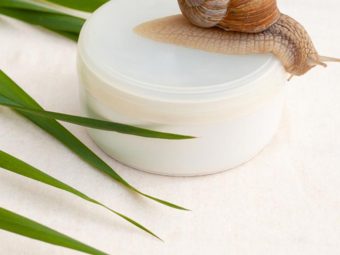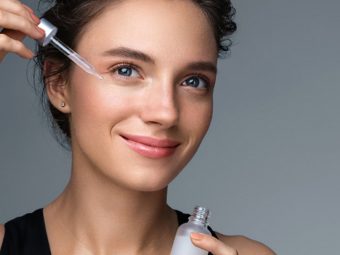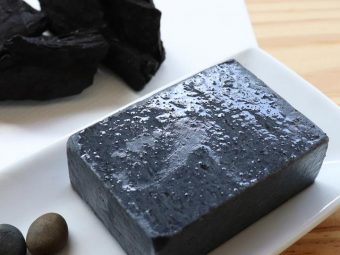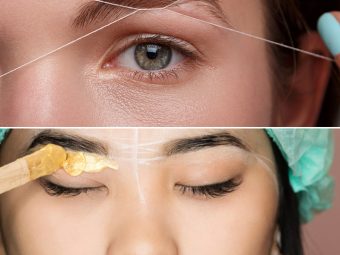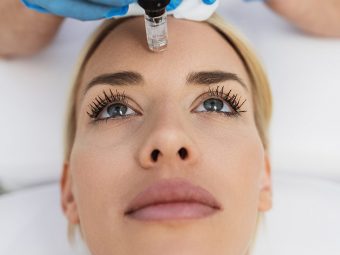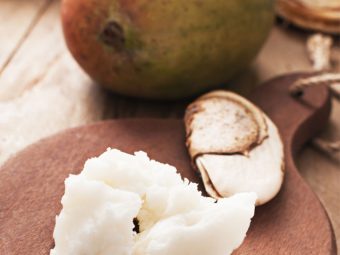Pycnogenol For Skin: Benefits, How To Use, And Side Effects
Get instant hydration and combat blemishes, fine lines, and wrinkles with ease.
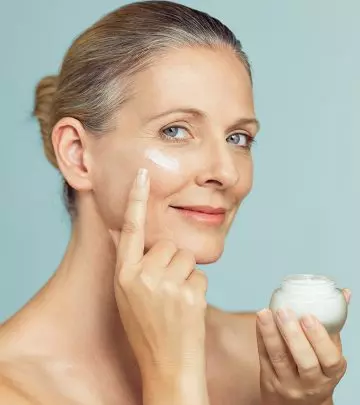
Image: ShutterStock
Pycnogenol is an ingredient that is fast gaining popularity in the beauty industry. But what is it used for? You can use pycnogenol for skin care issues like dryness and aging signs. Even though aging and skin dryness are part of life, these issues can affect your skin appearance and may make you conscious about it.
If you have considered using pycnogenol for your skin, it is important to understand if it is worth the hype. Here, we discuss the effectiveness of pycnogenol, its benefits, and how to use it. Keep reading.
 Know Your Ingredient: Pycnogenol
Know Your Ingredient: PycnogenolWhat Is It?
An extract obtained from the French maritime pine bark.
What Are Its Benefits?
Pycnogenol helps reverse the signs of aging, reduces pigmentation, and heals wounds.
Who Can Use It?
Individuals with dry, pigmented, and aged skin can use pycnogenol.
How Often?
Pycnogenol supplements can be consumed daily within doses of 50-450 mg; pycnogenol cream can be used for 7 days; pycnogenol skin powder and water paste can be applied daily.
Caution
Pycnogenol supplements should be consumed either with a heavy meal or right after one to avoid an upset stomach.
In This Article
What Is Pycnogenol?
Pycnogenol is the trademarked name of a substance extracted from the French maritime pine bark. It is rich in elastin, antioxidants, and collagen, and is ideal for treating dry, aging skin. The active ingredients in this plant extract can also be found in grape seed, witch hazel bark, and peanut skin. These ingredients are responsible for the characteristic skin benefits of pycnogenol.
 Trivia
TriviaWhat Are The Benefits Of Pycnogenol For Skin?
1. May Help Reverse Signs Of Premature Aging

In a study, 20 postmenopausal women were asked to consume 75 mg of pycnogenol every day for 12 weeks. The participants observed better skin hydration and elasticity by the end of the study period (1). Pycnogenol supplementation was found to help with anti-aging.
Pycnogenol may also promote the synthesis of collagen and hyaluronic acid. Reduced collagen levels are known to cause wrinkles (2). Research suggests that hyaluronic acid can retain skin moisture and help delay the aging signs (3).
2. May Help Reduce Pigmentation
As per research, pycnogenol may help reduce skin hyperpigmentation caused by exposure to UV radiation (4). It works by fighting free radicals, which otherwise break down the proteins responsible for maintaining your skin’s hue and elasticity.
Pycnogenol also enhances and accelerates the process of cell regeneration and replication (4). This compound is also believed to soften rough skin, soothe inflamed skin, and potentially reduce skin cancer risk. However, more research is warranted in this regard.
3. May Help Heal Wounds
An animal study showcased the wound-healing abilities of pycnogenol. The compound was found to accelerate wound healing and reduce the appearance of scars (5). However, more research is warranted to further understand the mechanism here.
Apart from these benefits, pycnogenol may also pose some side effects one must be aware of.
What Are The Side Effects Of Pycnogenol On Skin?
Pycnogenol is generally considered safe for use on skin. That said, you must start with a low dose to allow your body to get accustomed to the supplement. The potential side effects of pycnogenol include:
- Fatigue
- Vertigo
- Dizziness
- Headache
- Mouth ulcers
- Skin irritation
- Urinary issues
- Gastrointestinal issues
- Irritability
- Nausea
- Drowsiness
Rachel, a blogger, shared her experience of taking pycnogenol supplements daily on her blog. She said, “I started with 1 capsule (30 mg) and increased it to two capsules after a few weeks (i).” She added, “I noticed my stomach was acting up specially in the mornings, I take it after breakfast and dinner.” She mentioned that she stopped taking it for a few weeks after observing the stomach issue to understand what’s best for her body.
If you experience any of these side effects, stop the intake of the product and consult your doctor.
No matter how many benefits a product has, one will not be able to see results unless they use it appropriately. Read the next section to understand the best way to use pycnogenol on your skin.
How Do You Use Pycnogenol On Your Skin?
Pycnogenol is an OTC (over-the-counter) product. It is available in the following forms:
1. Supplement
As per the guidelines set by the National Institute Of Health, adults can ingest anywhere between 50 to 450 milligrams of pycnogenol supplements daily to achieve the desired results (6). However, more research is warranted to determine a safe dosage level for children.
 Quick Tip
Quick Tip2. Cream
You can use pycnogenol cream as part of your morning routine after you apply your serum and before you apply any heavy lotions or oils. You can use this cream for 7 days at a stretch. But if you do not notice any results even after 7 days, we recommend you visit a dermatologist.
3. Skin Powder
You can include this powder in your morning natural skincare routine. Here’s how:
- Combine the powder with some water and whisk until a smooth paste is formed.
- Apply the paste to your skin and leave it on for 15 to 20 minutes or until it is completely dry.
- Wash the dried paste off with lukewarm water.
- Dry with a soft towel.
- Complete this process by applying some oil or lotion to your skin.
Carry out this process every day for 6 weeks for the best results. If you do not experience any change even after 6 weeks, consult your dermatologist.
Can pycnogenol be used by all? Who would benefit the most from it?
Who Is Pycnogenol Best Suited For?
While everyone can use pycnogenol, the pine bark extract is best suited for individuals with aged, pigmented, or dry skin. But if you have any specific skin condition, it is always better to consult a dermatologist before using pycnogenol.
As discussed, you can use pycnogenol in various forms. The compound works well with certain ingredients too. Check them out in the next section.
What Ingredients Work Well With Pycnogenol?

Several ingredients can be paired with pycnogenol. These include:
- Vitamin C: The ingredient enhances the body’s collagen production (7). It helps firm up the skin and reduces any wrinkles and fine lines.
- Ginkgo Biloba: This is a potent antioxidant thought to work with pycnogenol to soothe skin and increase skin moisture. However, more research is needed in this regard.
- Hyaluronic Acid: Hyaluronic acid is a humectant that helps retain skin moisture. It hydrates the outer skin layers and reduces dry skin, pigmentation, and other signs of aging (3).
You can pair several ingredients with pycnogenol. However, there are a few other ingredients you must never use with this compound. We have covered them in the next section.
What Ingredients Should Not Be Paired With Pycnogenol?
It is believed that using pycnogenol with products containing copper peptides may cause adverse effects. However, research is limited in this regard. Consult your dermatologist for more information.
Infographic: A Simple Guide To Using Pycnogenol For Skin
If signs of aging, inflammation, and dry skin are your major skin care woes, pycnogenol is the perfect solution for you. This ingredient is rich in antioxidants and collagen, which can help boost your overall skin health. Check out the infographic below to know more about its benefits, side effects, and more before including it in your skin care routine.

Illustration: StyleCraze Design Team
Summing It Up
Pycnogenol is a substance commonly found in pine bark, grape seed, and witch hazel. Studies suggest that some of the benefits of using pycnogenol for your skin include slowing down aging, reducing inflammation, and helping with skin moisturization. It improves skin radiance and complexion and helps combat sun damage and photoaging as well. Pycnogenol is available in the form of supplements, cream, or skin powder for use. While pycnogenol is mostly considered safe for use, limited studies suggest that it may cause side effects such as irritation, nausea, or vertigo. If you experience these symptoms, stop using them at once and consult your doctor.
Frequently Asked Questions
Can I mix pycnogenol with moisturizer?
You can add 2-3 drops of pycnogenol to your moisturizer and apply it to your skin once or twice daily. However, it is worth using alone or mixing it with water-based serums, oils, or heavier creams to dramatically increase its antioxidant capacity.
Can I use pycnogenol and retinol together?
Yes, pycnogenol and retinol can be used together.
Can pycnogenol be used by individuals with sensitive skin?
Yes, it works well on all skin types, including sensitive skin.
Are there any age restrictions for using pycnogenol on the skin?
It is often used among older age groups with visible signs of aging and is not recommended for individuals below 18.
Key Takeaways
- Pycnogenol is rich in elastin and collagen fibers, which are important for dry, aging, and pigmented skin.
- The compound may boost the production of hyaluronic acid that seals skin moisture.
- It is available in the form of a cream, skin powder, and supplement and can reduce UV-induced oxidative stress and give UV protection.
Have you heard of pycnogenol? It is an amazing anti-aging ingredient that nobody talks about. Check out this video to know more about this interesting ingredient.
Personal Experience: Source
StyleCraze's articles are interwoven with authentic personal narratives that provide depth and resonance to our content. Below are the sources of the personal accounts referenced in this article.
i. Pycnogenol & other thingshttps://endowho.blogspot.com/2014/11/pycnogenol-other-things.html
References
Articles on StyleCraze are backed by verified information from peer-reviewed and academic research papers, reputed organizations, research institutions, and medical associations to ensure accuracy and relevance. Read our editorial policy to learn more.
- Pycnogenol® Effects on Skin Elasticity and Hydration Coincide with Increased Gene Expressions of Collagen Type I and Hyaluronic Acid Synthase in Women
https://www.karger.com/Article/Abstract/335261 - Skin anti-aging strategies
https://www.ncbi.nlm.nih.gov/labs/pmc/articles/PMC3583892/ - Hyaluronic acid: A key molecule in skin aging
https://www.ncbi.nlm.nih.gov/labs/pmc/articles/PMC3583886/ - Pycnogenol: A Miracle Component in Reducing Ageing and Skin Disorders
https://www.longdom.org/open-access/pycnogenol-a-miracle-component-in-reducing-ageing-and-skin-disorders-2155-9554-1000395.pdf - Pycnogenol® accelerates wound healing and reduces scar formation
https://onlinelibrary.wiley.com/doi/abs/10.1002/ptr.1477 - Maritime Pine
https://medlineplus.gov/druginfo/natural/1019.html - The Roles of Vitamin C in Skin Health
https://www.ncbi.nlm.nih.gov/pmc/articles/PMC5579659/










